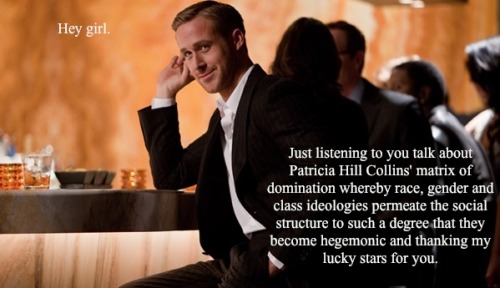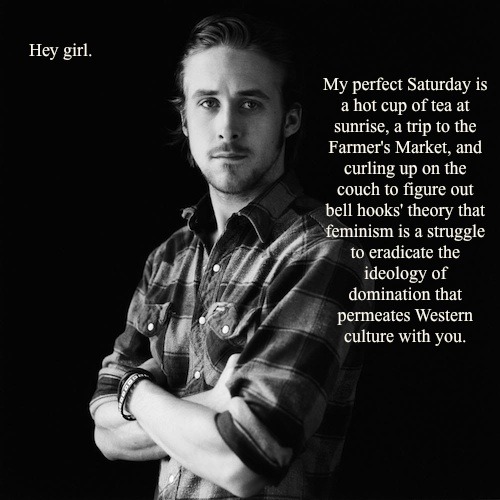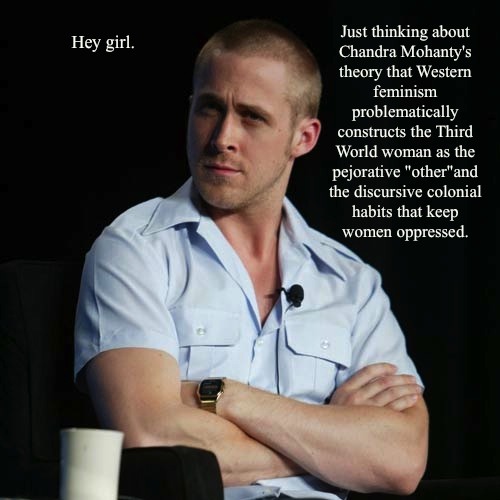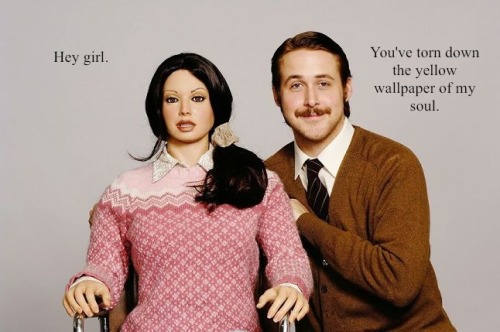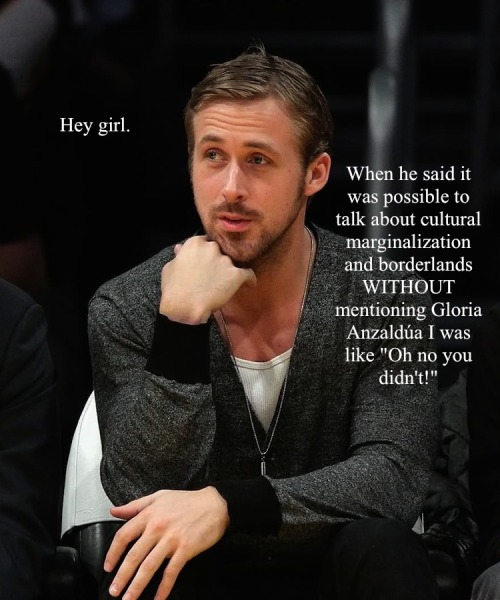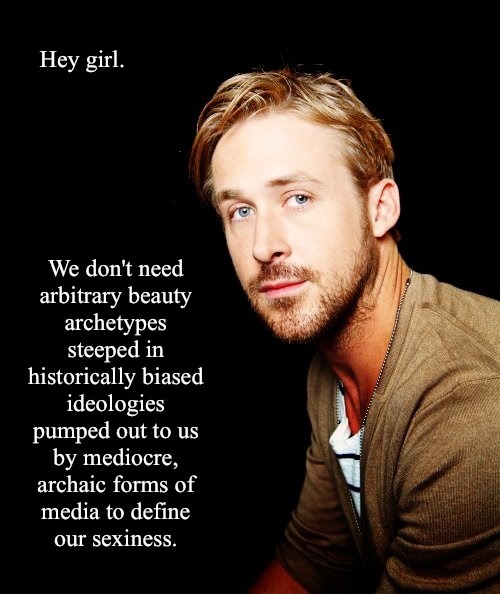I haven't posted on this blog for a while, but I've continued my feminist and gender studies through literary theory and post-colonial studies. Here's what I've learned more or less, presented to you in the words of Feminist Ryan Gosling. Who know's, maybe I'll even think up a few of my own soon. Some of my favorite thinkers have definitely been left out. Anyways, this is a taste :) Enjoy!
The She-roe Next Door
(Re)defining Everyday Feminism Around the Globe
Monday, February 13, 2012
Monday, April 18, 2011
HipHop Feminism: A response to "Boys Will be Boys"
My mind was drawing a blank.
The time came to turn in a proposal for our final paper and I was lost. I'd lost my words. They evaporated with the descent of enveloping helplessness. For someone who usually has something to say or write about, I was unable to formulate a sentence that, as described by Gloria Anzaldua, did not reek of "esoteric bullshit and pseudo-intellectualizing," (Speaking in Tongues 79). The past few weeks, I thought I had solidified my voice! Yet as I fidgeted on the couch, and again hours later at my desk, and futzed even more hours later on the floor hoping somehow that changing positions would facilitate the flow of inspiration, I couldn't come up with anything more than beautified truisms or broad generalizations to encompass my final paper topic. The cursor on my word document blinked dispassionately at my increasing frustration. Wasn't there something I could write about that was more than the regurgitation of things people way more knowledgeable than me had already said? Of course. Did I know how to take a different spin on it? That's where I faltered.
It was only after reading an article about "structural violence" - which taking a variety of institutionalized forms of "-isms" forms, systemically harms people by preventing them from meeting their basic needs - that I became curious at how the overarching themes of human rights and the restriction of agency when faced with poverty, could be applied to the TNF network. My sleuthing then led me to a documentary produced by Byron Hurt, titled HipHop: Beyond Beats and Rhymes. I was riveted within the first few minutes.
Investigating the display of manhood in HipHop, Byron Hurt wanted to know why the lyrics of young male rappers are saturated with ideals of gun play, killing other men, asserting dominance by putting fear into another man's heart, and feminizing the weaknesses of other men. As Dr. Michael Eric Dyson notes, "Masculinity is at heart of American identity," with the collective imagination of a man using violence to establish his position of authority and his manhood. Like many parts of Americana, such displays of masculinity also influenced the evolution of HipHop.
This is the question I will explore. The search starts here. And here too.
The time came to turn in a proposal for our final paper and I was lost. I'd lost my words. They evaporated with the descent of enveloping helplessness. For someone who usually has something to say or write about, I was unable to formulate a sentence that, as described by Gloria Anzaldua, did not reek of "esoteric bullshit and pseudo-intellectualizing," (Speaking in Tongues 79). The past few weeks, I thought I had solidified my voice! Yet as I fidgeted on the couch, and again hours later at my desk, and futzed even more hours later on the floor hoping somehow that changing positions would facilitate the flow of inspiration, I couldn't come up with anything more than beautified truisms or broad generalizations to encompass my final paper topic. The cursor on my word document blinked dispassionately at my increasing frustration. Wasn't there something I could write about that was more than the regurgitation of things people way more knowledgeable than me had already said? Of course. Did I know how to take a different spin on it? That's where I faltered.
It was only after reading an article about "structural violence" - which taking a variety of institutionalized forms of "-isms" forms, systemically harms people by preventing them from meeting their basic needs - that I became curious at how the overarching themes of human rights and the restriction of agency when faced with poverty, could be applied to the TNF network. My sleuthing then led me to a documentary produced by Byron Hurt, titled HipHop: Beyond Beats and Rhymes. I was riveted within the first few minutes.
Investigating the display of manhood in HipHop, Byron Hurt wanted to know why the lyrics of young male rappers are saturated with ideals of gun play, killing other men, asserting dominance by putting fear into another man's heart, and feminizing the weaknesses of other men. As Dr. Michael Eric Dyson notes, "Masculinity is at heart of American identity," with the collective imagination of a man using violence to establish his position of authority and his manhood. Like many parts of Americana, such displays of masculinity also influenced the evolution of HipHop.
As Jackson Katz, anti-sexist activist, asserts later, "If you’re a young man, and the culture tells you that being a man means being powerful, being dominant, being in control, having respect of your peers, but in reality you have no real power, one thing you do have is access to your body and the ability of presenting yourself physically as someone worthy of respect, and that’s one thing that accounts for the hyper-masculine posturing of men of color and poor white working class men. Men with more financial, work place, or other abstract forms of authority don't have to be as physically powerful because they can assert their power in other ways. (16:10)
The violence within hip hop lyrics brings up the question of desensitization to violence. The United States is an incredibly hyper-aggressive, hyper-masculine nation; one that endorses a culture of violence and that of conquer or be conquered. What fails to get noticed though in this narrative is how that type of manhood is ultimately a destructive one of "black death pimped by corporations" (19:30 / 20:45).
But is this display of manhood at the expense of womanhood? Especially women of color?
A prime example of the controversy surrounding HipHop and its objectification of women as only sexual objects is demonstrated by an event that gained national attention in April 2004. Nelly, a multi-platinum rap artist and businessman, was met with resistance at Spelman College, one of the most famous black women's colleges in the United States. Responding to a particularly explicit hip hop video called "Tip Drill," where Nelly is seen "swiping a credit card down a woman's backside," the student body threated to protest Nelly's presence at a philanthropic event. Nelly decided to not show up.
This issue of female objectification and degradation remains largely unaddressed. As asserted by Dr. Beverly Guy-Sheftall, a professor at Spelman college, "black people [generally speaking] do not believe that misogyny, sexism, and violence against women are urgent issues, but that [we] still believe that that racism, police brutality and black male incarceration are issues we should be concerned about (26:15) "If we have a glorified sense of our own victimization as black and brown men, what we must not miss and often do is that black and brown women are also victimized not only by white patriarchy but by black supremacy and the degree of violence of masculinity directed against them (26:26) follows Dr. Michael Eric Dyson.
The documentary then provides the viewer with harrowing statistics: (26:57)
- 1 in 4 black women are raped before they are 18
- Black women are 35% more likely to be physically assaulted than white women
- More than 700,000 women in the US are sexually assaulted each year; that’s 1 women every 45 seconds
- 61% of victims are under 18
This is the question I will explore. The search starts here. And here too.
Sunday, April 3, 2011
Malalai Joya / ملالۍ جویا : A woman among warlords
Malalai Joya's visa application was recently denied by a U.S. State Department consular officer. The reason? Because she was "unemployed" and “lived underground."
Well, duh.
Considering that Malalai Joya was forced into hiding AND has experienced five assassination attempts after her 2004 speech against the placement of warlords within Afghan parliament, denying her a visa to the US was an aggressive attempt to ignore the voice of a key advocate for the Afghan people. Having successfully applied for a U.S. visa four times before, this rejection was a politicized act: one responding to the fact that Joya is vocal in her opposition to U.S. policy and military involvement in her country.
After a letter writing campaign that flooded the offices of Hilary Clinton, the State Department reconsidered their decision, and finally granted Joya a three week visa to continue her tour as planned.
Who would have guessed that this prominent woman would not only speak at Harvard to promote her new book, but also a respectable yet much less recognizable venue as Willamette U. This woman has a message, and she's bound and determined to be heard. And she's appealing especially to young people. My Transnational Feminism class was privileged enough to even have her undivided attention for over an hour today. Least to say I was incredibly excited... yet I also had some questions.
Primarily we discussed issues surrounding the culture of war and its impact upon women. War culture, or the largely patriarchal power struggles that disempower already poor and vulnerable populations, wreak tremendous havoc upon the lives of women. Whether through rape, violence, disenfranchisement, lack of education, inability for self-sustainance, and overall robbing of agency both within the community and the household, contribute to the oppression of women and is exacerbated by war. With war, women's rights - already suffering from the ambiguities within the UN Declaration of Human Rights, are readily sacrificed for the cause OR are used and abused to promote foreign intervention. Afghanistan is a prime example, where the burqa has become a prime target for Western nations to help "end" oppression. Often Western narratives claim that to free the woman from the stuffy confines of the burqa is to empower her. That to bomb her village to kill Taliban forces - but also in the process killing her husband and child, or destroying her home - is to "help" her. Overall, the Afghan women is not only completely oppressed, she is completely unable to remedy her condition. She is a perpetual victim, powerless by the rhetoric constructing her. Thus, the Muslim Afghan woman must be "saved."
But does she?
Joya would answer, "Allhamdulilah, hellll no!"
Western intervention and military campaigns ironically continue to perpetuate the problems currently oppressing women, Joya argues. By simplifying the oppression of Afghan women to the burqa (which Joya has actually used to smuggle textbooks to her secret school in Kabul and protected her from the success of assassination attempts), the complexities that come with understanding the struggles of Afghan women are lost, instead becoming a convenient punchline for American taxpayers and privileged white feminists to readily buy into. The construction of the helpless Afghan woman and the call to arms of her American sisters to cast aside the burqa sadly misses the deeper issues that are silencing her. Ridding the Afghan woman of the burqa will not educate her. It won't give her skills necessary for employment. It won't even free her from the oppression inflicted by men.
In essence, "saving" the Afghan woman is contributing to her oppression. By denying the Afghan woman's ability for self-determination, by perpetuating her victimization through warfare, the West is helping to sustain her vulnerability.
Its like the sour, violent twist of a "white horse" fairy tale, where in riding up to a fair maiden "needing" rescue, the rider doesn't see her and instead pummels her into the muddy misunderstandings found within the greatest tragedies. And history repeats itself... as Libya may reveal in the coming months.
Joya's facilitation of our class discussion and her lecture later in the evening only lead me to additional questions. Moreover, I was left feeling despondent. After hearing stories of unimaginable atrocities commonplace in a land under siege, and hearing Joya express her frustration with the role the U.S. has played in debilitating the autonomy of Afghan women, I was left disoriented.
What do WE, acting within the parameters of a global sisterhood, DO in responding to the conditions of women in Afghanistan???
Unsurprisingly, Joya offered a plan of action: the United States must withdraw from Afghanistan, largely so that Afghan women have "only the warlords and the Taliban leftover to fight."
No wonder this disturber of the peace didn't get a US visa.
Well, duh.
Considering that Malalai Joya was forced into hiding AND has experienced five assassination attempts after her 2004 speech against the placement of warlords within Afghan parliament, denying her a visa to the US was an aggressive attempt to ignore the voice of a key advocate for the Afghan people. Having successfully applied for a U.S. visa four times before, this rejection was a politicized act: one responding to the fact that Joya is vocal in her opposition to U.S. policy and military involvement in her country.
After a letter writing campaign that flooded the offices of Hilary Clinton, the State Department reconsidered their decision, and finally granted Joya a three week visa to continue her tour as planned.
 |
| Reflection of an activist who "raised her voice" |
Primarily we discussed issues surrounding the culture of war and its impact upon women. War culture, or the largely patriarchal power struggles that disempower already poor and vulnerable populations, wreak tremendous havoc upon the lives of women. Whether through rape, violence, disenfranchisement, lack of education, inability for self-sustainance, and overall robbing of agency both within the community and the household, contribute to the oppression of women and is exacerbated by war. With war, women's rights - already suffering from the ambiguities within the UN Declaration of Human Rights, are readily sacrificed for the cause OR are used and abused to promote foreign intervention. Afghanistan is a prime example, where the burqa has become a prime target for Western nations to help "end" oppression. Often Western narratives claim that to free the woman from the stuffy confines of the burqa is to empower her. That to bomb her village to kill Taliban forces - but also in the process killing her husband and child, or destroying her home - is to "help" her. Overall, the Afghan women is not only completely oppressed, she is completely unable to remedy her condition. She is a perpetual victim, powerless by the rhetoric constructing her. Thus, the Muslim Afghan woman must be "saved."
But does she?
Joya would answer, "Allhamdulilah, hellll no!"
 |
| Times article arguing that to leave Afghanistan is to abandon Afghan women to their oppressors. Joya would respond that in leaving Afghanistan, Afghan women have one less oppressor to fight... |
Western intervention and military campaigns ironically continue to perpetuate the problems currently oppressing women, Joya argues. By simplifying the oppression of Afghan women to the burqa (which Joya has actually used to smuggle textbooks to her secret school in Kabul and protected her from the success of assassination attempts), the complexities that come with understanding the struggles of Afghan women are lost, instead becoming a convenient punchline for American taxpayers and privileged white feminists to readily buy into. The construction of the helpless Afghan woman and the call to arms of her American sisters to cast aside the burqa sadly misses the deeper issues that are silencing her. Ridding the Afghan woman of the burqa will not educate her. It won't give her skills necessary for employment. It won't even free her from the oppression inflicted by men.
In essence, "saving" the Afghan woman is contributing to her oppression. By denying the Afghan woman's ability for self-determination, by perpetuating her victimization through warfare, the West is helping to sustain her vulnerability.
Its like the sour, violent twist of a "white horse" fairy tale, where in riding up to a fair maiden "needing" rescue, the rider doesn't see her and instead pummels her into the muddy misunderstandings found within the greatest tragedies. And history repeats itself... as Libya may reveal in the coming months.
Joya's facilitation of our class discussion and her lecture later in the evening only lead me to additional questions. Moreover, I was left feeling despondent. After hearing stories of unimaginable atrocities commonplace in a land under siege, and hearing Joya express her frustration with the role the U.S. has played in debilitating the autonomy of Afghan women, I was left disoriented.
What do WE, acting within the parameters of a global sisterhood, DO in responding to the conditions of women in Afghanistan???
Unsurprisingly, Joya offered a plan of action: the United States must withdraw from Afghanistan, largely so that Afghan women have "only the warlords and the Taliban leftover to fight."
No wonder this disturber of the peace didn't get a US visa.
Tuesday, March 8, 2011
Monday, March 7, 2011
Live like a lotus, above the muddy water
I very rarely cry...well, at least publicly anyways. For me, crying is a sacred act; an act of pent up emotion and energy that has been suppressed for too long. While growing up, unlike most little girls who often shed tears over skinning their knees, I somehow convinced myself that crying was a sign of weakness. Stubborn even at a young age, I could effectively muster the will of my little body to silence the bubbling of pain that so often leaked through the eyes of others.
Forcing myself to maintain a tough shell was hardly healthy. In first grade, I vividly remember hobbling around a whole day with an angry, swollen, sprained ankle after falling off my unicycle because I was too embarrassed to tell anyone or ask for help. I remember hoping that someone would notice me and ask how I was, in which I would casually account for the injury and save face from myself. Or as an alternative, I daydreamed of being confronted by someone, perhaps a friend, teacher, my favorite librarian, or even a stranger, in which I would have to assuage their worries, minimizing the pain, and in essence playing the humble six-year-old martyr.
Suffering for the sake of principle - at least for my six-year-old self wanting to look tough so that she'd be chosen first to play soccer with the boys - is worth it. That's what a martyr does. It comes with the job description.
Suffering for the sake of principle - at least for my six-year-old self wanting to look tough so that she'd be chosen first to play soccer with the boys - is worth it. That's what a martyr does. It comes with the job description.
But suffering as the result of constructed societal conditions? Suffering imposed because of tradition? Suffering not because one accepts the consequences of choices, but rather suffering as an act of attrition?
The last two weeks in class have been spent discussing the politics of global cultural practices that oppress or commit acts of violence against women.
Willamette's Women and Gender Studies department sponsored another transnational feminist movie. Water, directed by Deepa Mehta, examines the plight of a group of Indian widows living a life of poverty at a temple in the holy city of Varanasi. Forced into the austere life of a widow at the age of 7, the film focuses on the life of Chiuya and her widow sisterhood of all ages.
The minute women become widowed, they are stripped of their sexuality, class, and privilege. Women shave each others heads, wear only white clothing to detract attention, and eat bland food in order to demonstrate dedication to living a life without human desire. Considering that the rule of law fails to protect women from a state of vulnerability, widows have three options: 1) sacrifice herself, so she too will become godly, 2) join an "ashram," or temple of widows, or 3) marry the younger brother of the deceased husband. All three options commodify women to the whims of men and their families who have no interest in feeding one more mouth after the wife's status becomes irrelevant upon her husband's untimely death. As noted by Narayan, the young lawyer and follower of Gandhi, "Disguised as religion, it's just about money. One less mouth to feed. Four saris saved, one bed, and a corner is saved in the family home." Failing to choose any of the options however places a widowed woman into an existential crisis, perpetuated by dependency, and in not having free choice, must choose between the lesser of all evils. Thus, the expectations imposed upon widows to live the rest of their lives in mourning makes female agency inextricably tied to the pressures of cultural and society.
 |
| Chiuya, played by Sarala Kariyawasam |
And so the viewer follows the colorful cast of women:
Chiuya, the little widow whose youthful energy (and sometimes tantrums) begins to prod at the dutiful resignation of her widow-sisters, is the catalyst for change within the ashram. Her rape and her escape on Gandhi's train from the traditions that envelop Varanasi, ultimately depict how Chiuya's fate could easily become the fate of India's future.
Kalyani, the beautiful widow who is allowed to keep her hair to attract "solicitors" and becomes embroiled in a Romeo/Juliet style romance. Her lighter complexion and green eyes make her "beauty" an interesting point of commentary. Entrapped by both honor and an oppressive caste system that causes her to desperately search for alternatives, Kalyani ultimately takes her own life in an act of agency, refusing to participate in the system for any longer.
Shakuntala, the only educated widow of the group, her ability to read elevated her status and gave her more influence. Preserved for years by her faith in scripture, her world turns upside down with the realization of patriarchy-infused custom that has disabled her ability to create meaning in her life. "If self-fulfillment means detachment from wanting worldly desires, then no, I have not found it," she mused aloud. Her questioning of her faith reveals an interesting perspective of the politics of knowledge.
I made it through the whole movie without a tear. And then came the final scene: of Shakuntala shoving Chiuya into the arms of Gandhi's followers and watching the train, her opportunity for escape, disappear.
And then silent tears were streaming down my face.
Futility. Helplessness. Misery.
A country moving forward but leaving its women behind in ruin.
If there are no other arguments to support the "global sisterhood" other than the universality of the overall human condition, and the inherent interest of women in the affairs of other women, it would still be enough to find commonalities within the female experience, and enable those uncomfortable questions to be asked and those tears to cry together. Cultures and societies may be different, but there are some universal values that demand more than meek deference to the inability of cultural relativism to address the flaunting of human - and thus womens - rights violations.
Tuesday, February 22, 2011
linguistic resistencia, a struggle of the sisterhood
She walked brusquely into the classroom, heels clicking, hair in perfect formation. She immediately was one of those teachers that students learned to recognize as early as elementary school as someone who meant business. Moments later Prof. Micheaux introduced Natasha Behl. Her dark eyes flashed excitedly over the class. If there was such a thing as rolling up ones sleeves within the brain, its effect was certainly making an impact upon all of us awaiting the start of our discussion for the day.
The topic? Writing as a tool of resistance, and what it means for women within the transnational feminist framework.
Our discussion was focused on Women Writing Resistance, a collection works composed by mujeres de color addressing the way in which women are subjugated to the power structures of the status quo...and how they are fighting such oppression. From Gloria Anzaldua, to Aurora Morales, Ruth Irupe Sanabria, and the Combahee River Collective Statement, women have found language - in all its forms and voices - to be the crux of not only resistance, but empowerment.
Language, and those who use it to construct various realities, is inherently tied to status. The divide between those who are educated and uneducated alienates voices from the "narrative" (or at least the narrative heard by privileged white women) of the sisterhood. Having learned how to express themselves within the confines of stuffy academia, writers like Gloria Anzaldua express incredible frustration about the consequential limitations. "I have not yet unlearned the esoteric bullshit and pseudo-intellectualizing that school brainwashed into my writing," (79) wrote Gloria Anzaldua in her piece, Speaking in Tongues: A Letter to Third World Women Writers. "We speak in tongues like the outcast and the insane. Because white eyes do not want to know us, they do not bother to learn our language, the language which reflects us, our culture, our spirit" (80). And so, in an act of rebellion, Anzaldua and the other female writers mentioned above begin to place their "wild," and "native" tongues into their writing; writing against white privilege and white systems, but also traditional forms of feminism that fail to take into account the diversity of stories untold. The result are short, sharp, shrewd, sassy essays of spanglish syntax.
"i ain't denying nothing
i'm a contradiction
in its self
an' this
is how I SPEAK so listen y escuchalo bien
cuz you know how I be feelin'
'bout repitiendome
tu ve, es que
this is what I have become..." (Sanabria 95)
But don't get too comfortable yet.
Sanabria, in "Las aeious" relates a story where her professor refused to accept a paper, claiming that Sanabria must have plagiarized the assignment because her written "voice" didn't match her latina slang...apparently not sounding "barrio enough" (92) And so, a "defense against the racist silencing and shaming of our voices in American society," began and united the Black woman writing from a New York tenement, the Indian woman walking to work lamenting the lack of time, and the Chicana fanning away mosquitoes, the hot air, and the embers of her penciled words.
And so we again begin to witness the intersectionality of race, class, and privilege in constructing gender identities. Interestingly enough however, the sisterhood is sustained by solidarity found through writing.
This new language, the language of "the borderlands," builds greater intimacy within the spectrum of experiences. An invitation to hear an unaltered voice, such language demonstrates a hybrid of identities, yet also places responsibility on those who listen or read, to act! Language is political. By meeting halfway, borderland language represents a desire to negotiate, to understand both sides of the border, and ultimately construct a new consciousness.
The limits of language, limits one's world. These female resistance writers are reminding us to try navigating by other voices.
Wednesday, February 9, 2011
A Plea for Sisterhood
Get Inspired.
I do believe in a sisterhood. Despite the struggles, a movement for women, by women, respecting the diversity of struggles around the globe and refusing to find narratives mutually exclusive...a global sisterhood is not so hard to conceive...
In fact it is harder to ignore...
Subscribe to:
Comments (Atom)
